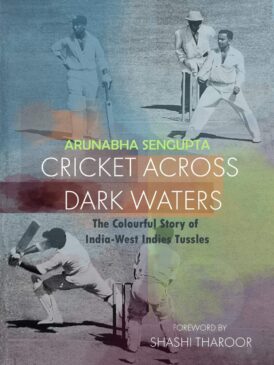Cricket Across Dark Waters
Martin Chandler |Published: 2025
Pages: 509
Author: Sengupta, Arunabha
Publisher: CricketMASH/Royards
Rating: 4.5 stars

There have been a vast number of books published on individual Test series, a favourite genre of many cricketing bibliophiles. Not far behind are books on the history of Test cricket generally, and indeed Arunabha Sengupta has contributed to that particular section of the game’s literature on more than one occasion himself.
The above observation made I should say that, to be fair to Arun, he could never be accused of producing anything formulaic. His books looking at the controversy over the 1970 South African tour of England, the visit of the Indian tourists the following year and his look at the Ashes are all full of originality.
And exactly the same can be said of Cricket Across Dark Waters. Padwick’s Bibliography of Cricket tells me that there have been a number of attempts in the past at writing histories of the cricketing rivalry between India and West Indies, but none will have done so in the way that Arun has.
India and West Indies acquired Test status at the same time, as long ago as 1926, but they did not then contest a series for two decades, until West Indies visited India in 1948/49. There were further series in 1952/53, 1958/59, 1961/62 and 1966/67 before finally, in 1970/71* a series between the two sides was recorded in a tour account.
And what of the results? West Indies won each of the first two series 1-0, but after that they won ten of the next thirteen Tests. In 1970/71 India had never won even a single Test against West Indies, so their 1-0 triumph in the Caribbean was not expected. In recent years of course the boot has been on the other foot, with West Indies rarely being competitive.
Arun deals with the unfolding drama on a series by series basis, finishing with a brief summary of the results of the Tests and, latterly, ODIs and T20 contests as well. A significant part of each series is also taken up with reports on the Tests. These are not detailed accounts of the play in the manner of a traditional tour account, but are nonetheless full and satisfying summaries of the individual matches.
But of course that isn’t all there is in the book, far from it. For that first series back in 48/49 India was a newly independent country, and political momentum towards independence was picking up throughout the Caribbean until, in the 1960s, the traditional cricketing centres of Jamaica, Barbados, Trinidad and Tobago and Guyana all became independent countries.
I have always been interested in the past and particularly British history, and that of our former Empire and now Commonwealth. In recent years I have learned that much of what I thought I knew was inaccurate and, occasionally, simply untrue. In my education important details were simply overlooked, and crucial context was missing, even from reputable sources.
What my schoolteachers never told me about at all was the relationship and links between India and the West Indies. In time my passion for cricket filled in some of the gaps there, but only now do I feel I have a grasp on that subject as well. Cricket Across Dark Waters is as rewarding a read on non cricketing subjects as it is on those poorly chronicled Test series of the 1950s and 1960s.
One aspect of the book that I particularly enjoy is the way that the narrative is presented. There are no long passages of writing, rather each chapter, dealing with each tour, is divided into a number of discrete parts. Each Test has one section devoted to it, and the political and social issues of the time are considered separately and, in addition, there are many brief interludes that deal with a variety of digressions, usually but not always cricketing ones.
There is much diversity in the subject matter of these segments, but to give a flavour I will mention four specific examples. One is on whether of not Sonny Ramadhin actually had a christian name, another is on the issue of Sunil Gavaskar’s use of protective headgear and, changing the tone, the appearance of players from both sides in cameo roles in a film in which Indian batsman Sandeep Patil had a starring role in 1983.
And the fourth is the most tantalising of all. I have long sought a detailed account of the appearance of four West Indian fast bowlers, Chester Watson, Charlie Stayers, Roy Gilchrist and Lester King, in Indian domestic cricket in 1962/63. Given the book’s mission statement that could only ever be a peripheral part of Cricket Across Dark Waters, but Arun’s mention of it might, I hope, inspire someone to write up that story whilst the events are still just within living memory.
But that one is a hope for the future. In the here and now Cricket Across Dark Waters is a long overdue and very welcome addition to the literature of cricket. It is a thoroughly worthwhile investment and, at £14.99 for a 500+ page book, very reasonably priced.
*In fact there is a book on the 1948/49 series based on the diary kept by West Indian opener Jeff Stollmeyer, but that wasn’t published until 2003.






Excellent review if Arunabha Sengupta’s research on matches between WI & INDIA. Arun’s detail is mainly based on accuracy of the events which makes him a unique writer compared to many cricket Bluffers who have been misleading people. Martin’s review does point this out.
Comment by Qamar Ahmed | 2:35pm BST 31 March 2025